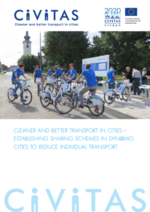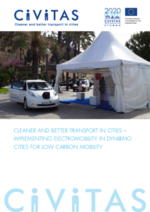Two new publications from CIVITAS DYN@MO
At the CIVITAS Forum 2015 in Ljubljana the CIVITAS DYN@MO project presented two recently published new brochures focusing on electromobility and sharing schemes. The brochures are the two final ones of a series of four brochures that each focus on one specific topic addressed by the DYN@MO project.
The brochure “Implementing Electromobility in DYN@MO cities for low carbon mobility” describes how the DYN@MO cities Aachen, Gdynia, Koprivnica and Palma are using – each city in its own way and own scale – a combination of instruments to speed up the wider uptake of electric vehicles among the city’s fleet and households. Frontrunner Aachen has set ambitious goals for all transport modes in its long-term e-mobility vision and relevant stakeholders are involved through embedding the topic in its regional Sustainable Urban Mobility Planning (SUMP) process. In Gdynia, great achievements have been reached by the successful implementation of technical innovations in order to build up a more efficient trolleybus system. The city of Koprivnica has overcome numerous barriers by implementing an e-car charging system, an e-car sharing system and a new e-bus public transport system. The city of Palma has been demonstrating electric vehicles to its citizens by procuring different kinds of e-vehicles within their own fleets and, in addition, the city has introduced different kinds of incentives in order to create a favourable climate for the early adopters of electric vehicles.
The brochure “Establishing sharing schemes in DYN@MO cities to reduce individual transport” describes the practical experiences of the cities’ introduction and extension of the usage of sharing schemes with traditional bicycles, electric bicycles as well as with electric and hybrid cars. Numerous advantages of sharing schemes are pointed out in the brochure. Besides saving money for the individual and improving the environment, the concept paves the way for multi-modal use of transport systems since the vehicle-sharing concept excels at high flexibility due to the independency of timetables and predetermined routes. Automated sharing systems can reliably be in operation year-round, day and night. Furthermore, the user freely chooses the fastest route to his destination not being bound to bus or train lines. In other words, a vehicle-sharing system adds customer value to the whole transport chain.
In September 2014, DYN@MO had published its first two brochures, covering the topics “Converting regular buses to clean vehicles” and “Participation 2.0 in the Sustainable Urban Mobility Planning process”.










